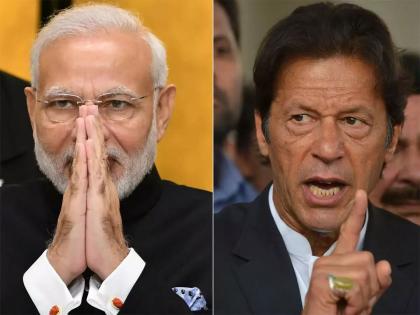Modi's Midnight Snub: Qatal ki Raat and the Rejection of Imran's Urgent Call
By Lokmat English Desk | Published: January 8, 2024 09:14 AM2024-01-08T09:14:26+5:302024-01-08T09:15:13+5:30
In a tense situation with nine Indian missiles reportedly aimed at Pakistan, the alarmed Pakistani government urgently approached then ...

Modi's Midnight Snub: Qatal ki Raat and the Rejection of Imran's Urgent Call
In a tense situation with nine Indian missiles reportedly aimed at Pakistan, the alarmed Pakistani government urgently approached then Indian High Commissioner Ajay Bisaria at midnight. Their objective was to diffuse the escalating crisis by facilitating a conversation between Prime Minister Imran Khan and Prime Minister Modi. This pivotal moment unfolded on the night of February 27, 2019, characterized by Modi himself as the "night of bloodshed" (qatal ki raat). It marked the first of the two nights during which Wing Commander Abhinandan Varthaman was held in Pakistan's custody following the aerial dogfight earlier that day.
In his upcoming book, 'Anger Management: The Troubled Diplomatic Relationship Between India and Pakistan,' Ajay Bisaria meticulously recounts the intricate details of the events following the capture of Wing Commander Abhinandan Varthaman. This episode, characterized by India's strategic diplomacy, ultimately led to the pilot's release two days later.
On the night of February 27, 2019, referred to as the "qatal ki raat," a nervous Pakistani government urgently sought dialogue between Prime Minister Imran Khan and his Indian counterpart, Narendra Modi. High Commissioner Ajay Bisaria received a call from Pakistan's High Commissioner Sohail Mahmood, expressing the desire to facilitate this crucial conversation. The following day, Khan announced the release of Wing Commander Abhinandan Varthaman as a peace gesture.
Bisaria's book sheds light on the behind-the-scenes dynamics, revealing the effectiveness of India's coercive diplomacy. Western diplomats played a pivotal role in conveying the gravity of India's threat to escalate the situation if any harm befell Abhinandan. The narrative underscores how India's strategic maneuvers compelled Pakistan to reconsider its stance on terrorism.
India has called upon Pakistan to hasten the release and repatriation of 184 Indian fishermen who have served their sentences. Alongside this appeal, India has requested prompt consular access to the 12 remaining civilian prisoners suspected to be Indian nationals. The two nations routinely exchange lists of civilian prisoners and fishermen biannually. India has already provided Pakistan with its lists, which include 337 civilian prisoners and 81 fishermen currently in Indian custody, either confirmed as Pakistani nationals or suspected to be. Correspondingly, Pakistan has shared its own lists, detailing 47 civilian prisoners and 184 fishermen believed to be Indian, currently under its custody.
Open in app